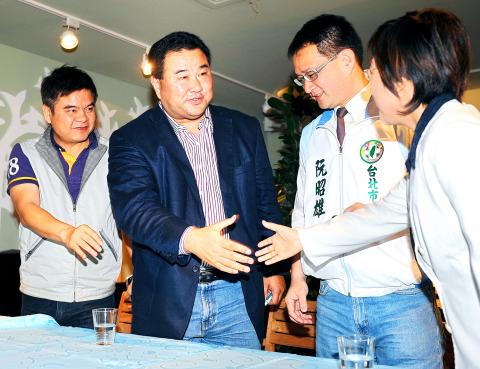Chao Shih-chiang (趙士強), a former general manager of the Taiwan Major League, yesterday announced his campaign for legislator in Taipei, giving the Democratic Progressive Party (DPP) a high-profile recruit in the electoral battleground.
Chao, a former national baseball player who positions himself as a political outsider largely above partisan fighting, said he stands on the side of “professionalism” and stressed that sports fans and athletes needed a voice in the legislature.
“I have been the fourth batter, the strongest batter, my entire life. I believe that this [designation] isn’t easily given. Chiang should get ready,” he said about his upcoming election battle against incumbent Chiang Nai-shin (蔣乃辛) of the Chinese Nationalist Party (KMT).

Photo: Fang Pin-chao, Taipei Times
The baseball superstar will become the first prominent DPP politician to seek Taipei’s Da-an District seat, a pan-blue stronghold that former KMT legislator Diane Lee (李慶安) vacated in 2009 after being found guilty of illegally holding dual Taiwan-US citizenship.
A by-election held later that year was won by Chiang, who led by almost 10,000 votes, about 10 percent of the total.
The DPP identified Chao early on as a possible contender who could provide the party with a much needed boost in the ratings, but Chao initially was reluctant.
Known in baseball circles as “Smiling George,” Chao said his hesitation had come after opposition from his family — who had expressed concern over his health.
“After two weeks of discussions they still aren’t very happy, but they will reluctantly support me,” he said while registering with the DPP as a party member in the morning. “For my family, it wasn’t a problem of pan-blue or pan-green, but whether the political road would become too tiring.”
Chao will be up against Chiang, a seven-term city councilor who remains hugely influential in the area. Chiang said he respected Chao’s decision to run, saying that it was still early in the race and that the final decision would rest with the voters.
DPP strategists think Chao’s addition to the party’s ranks will put the seat within the party’s grasp and add to the DPP’s momentum in Taipei, which went entirely to the KMT in 2008. Some strategists say that Chao’s appeal lay largely with undecided voters.
“Sport has no political divides,” DPP Taipei branch director Chuang Ruei-hsiung (莊瑞雄) said, adding that voters want to see a “legislator who can truly speak for athletes” and Taiwan’s sports industry. “Chao will appeal to both pan-blue and pan-green voters.”
Chao said that if elected, he would also focus on health and care of the elderly. He would also aim to increase the profile of Taiwanese athletes internationally, he said, stressing that these were some of his policies that the DPP had sided with.
“Personally, I have no so-called political color,” he added.
Chao’s recruitment comes as the DPP has been finalizing its legislative nomination list that is expected to be announced sometime near the end of next month. The latest round of confirmed candidates includes city councilors, a professor and an elementary school principal.
Incumbent legislator Lai Kun-cheng (賴坤成), who lost the DPP primary in Taitung County, will instead run in Hualien County, the party announced.
DPP spokesperson Cheng Wen-tsang (鄭文燦) said the legislator-at-large candidates would be chosen by a nine-member committee to be headed by DPP Chairperson Tsai Ing-wen (蔡英文) sometime before June 29.

Japanese footwear brand Onitsuka Tiger today issued a public apology and said it has suspended an employee amid allegations that the staff member discriminated against a Vietnamese customer at its Taipei 101 store. Posting on the social media platform Threads yesterday, a user said that an employee at the store said that “those shoes are very expensive” when her friend, who is a migrant worker from Vietnam, asked for assistance. The employee then ignored her until she asked again, to which she replied: "We don't have a size 37." The post had amassed nearly 26,000 likes and 916 comments as of this

Taiwanese can file complaints with the Tourism Administration to report travel agencies if their activities caused termination of a person’s citizenship, Mainland Affairs Council Minister Chiu Chui-cheng (邱垂正) said yesterday, after a podcaster highlighted a case in which a person’s citizenship was canceled for receiving a single-use Chinese passport to enter Russia. The council is aware of incidents in which people who signed up through Chinese travel agencies for tours of Russia were told they could obtain Russian visas and fast-track border clearance, Chiu told reporters on the sidelines of an event in Taipei. However, the travel agencies actually applied

US President Donald Trump said "it’s up to" Chinese President Xi Jinping (習近平) what China does on Taiwan, but that he would be "very unhappy" with a change in the "status quo," the New York Times said in an interview published yesterday. Xi "considers it to be a part of China, and that’s up to him what he’s going to be doing," Trump told the newspaper on Wednesday. "But I’ve expressed to him that I would be very unhappy if he did that, and I don’t think he’ll do that," he added. "I hope he doesn’t do that." Trump made the comments in

Tourism in Kenting fell to a historic low for the second consecutive year last year, impacting hotels and other local businesses that rely on a steady stream of domestic tourists, the latest data showed. A total of 2.139 million tourists visited Kenting last year, down slightly from 2.14 million in 2024, the data showed. The number of tourists who visited the national park on the Hengchun Peninsula peaked in 2015 at 8.37 million people. That number has been below 2.2 million for two years, although there was a spike in October last year due to multiple long weekends. The occupancy rate for hotels